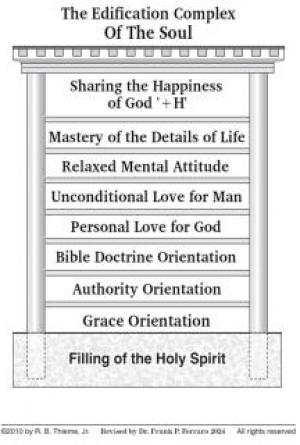EPILOGUE
So let us seize and hold fast and retain without
wavering the hope we cherish and confess, and
our acknowledgment of it, for He who promised
is reliable and faithful to His word.
Heb 10.23 (AMB)
Since publishing the first edition more than twenty years ago), it is appropriate that I express my current thinking on the topic. World peace and safety have continued to deteriorate since then, perhaps not on the scale of ‘911’ in the USA, yet each year there are new threats—war, terrorism, ‘pandemics’, and financial meltdowns. Possibly signaling the ‘beginning of birth pains’ (Matt 24.8 NIV) Jesus said would end the age; even the apocalyptic ‘fourth seal’ (Rev 6.7) may have opened to unleash the ‘sword’ the ‘pale rider of death’ wields to take
‘peace from the earth’ (Rev 6.7,8). No doubt the years immediately ahead will see more of these ‘signs of the times’.
As a fitting conclusion to this revision, I also have added some pertinent counsel.
Two threats have posed a special threat to the stability of the world. With the first, the ‘global financial crisis’ (GFC), poised to reoccur and bring even greater misery, for though supposedly ‘patched’, it is hardly reassuring when experts say, with the wrong move it is a ‘house of cards’ ready to collapse again. The second, the so-called Covid-19 ‘pandemic’, also has left its mark on more than a few nations, leaving them burdened with debt they can never repay.
However, the stronger indicator we are probably in the
‘closing innings’ is the current breakdown in harmony and cohesion in many nations. For me, the fulfillment of a ‘sign of the times’ predicted when Christ said ‘nation will rise against nation and kingdom against kingdom’ (Matt 24.7). While few
would doubt international conflicts between nations fulfill this scenario, the sign can also speak of discord within the same nation or kingdom. In other words, the current rising tide of societal disharmony destroying the relative peace existing previously between different tribes, social groupings, ethnicities, and even genders. No doubt, several factors are pitting the sectors of society against each other, including radical Islam, multiculturalism, social inequality, and opposing ideologies in politics, social issues, and religion. But whatever the causes, the strands within nations are unraveling fast to see internal discord bring increasing mistrust and polarization.
Friction between the haves and the have-nots, between political ideologies, races, even sects within the same religion, and between law enforcement and the general populace—all making civil war a real possibility in the future.
As this age comes to an end, these ‘birth pains’ for the new age will only get stronger and more frequent, bringing not only further breakdown in cohesion but associated societal ills, e.g.
cheating, bribery, corruption, violence, and immorality. Almost certainly an indicator the ‘distress of nations’ (Lk 21.25) is almost upon us. Any further increase in this chaos and erosion of standards and we are either blind or in denial to not see the days of ‘Noah’ and ‘Lot’ (Mat 24.37) knock at the door.
Thank God, a window of opportunity still exists to prepare for this trouble; it is not too late to seek the Lord to find the paths to walk in to be fortified for what lies ahead. Now, while Scripture teaches believers ‘found worthy’ (Lk 21.26) will escape the time of ‘Great (mega) Tribulation’ (Matt 24.21, Rev 2.22), it also points out how everyone alive (godly and ungodly) must endure this earlier period of trials. And while the ‘labor pains’ in this earlier time of ‘much (polus) tribulation’ (2Cor 2.4) will be hard to bear, they will not be the intense suffering of the ‘ Great ( mega) Tribulation’. This lead-up period, then, will test the faithfulness of every believer and
demand more than just patience; to ‘bear up’ under it all requires the more robust trait of endurance, and its ‘staying power’ is dependent on having the right hope. The one the author tells us is the ‘anchor for the soul’ (6.18,19) and the one advanced in this book. Without the hope of perfection in the heart, many believers will not be able to endure even this earlier time of trial, with more than a few backsliding and others ‘falling away’ altogether from the suffering endured.
I also have warned about the danger of trusting in the wrong hope, and one of the worst is expecting to escape all tribulation in a silent ‘rapture’. Yes, believers subscribe to other false hopes—going bush to a ‘survival’ hideout or trusting in wealth and influence—and these too will be useless in a time of severe trial and suffering. Hence, without this hope of reaching ‘perfection’ and its associated outcomes in the heart, many will not endure the trials. One of these outcomes is the hope of divine protection in a ‘wilderness’ (Rev 12.6), the place of refuge also known poetically in the Psalms as ‘under the shadow of His wings’ (Ps 57.1).
Now, this ‘blessed hope’ of perfection is closely associated with an ‘appearing of…Jesus Christ’ (Tit 2.13), and for me, this has to be His secret return. But whatever is believed about this ‘appearance’ and its timing, it will still be difficult even for those with a tight grip on this hope of perfection. What is about to be loosed upon the earth will test everyone severely, especially when demonic powers add to the trauma of this time with dark thoughts of despair, ripping even this hope from some believers. And when such thoughts can morph into apathy and indifference, the determination to remain faithful to the Lord can dissolve very quickly. Yet, having this hope of perfection in the heart still gives the best chance of withstanding this period of doubt, hurt, and bitterness.
I want now to close with what the Lord is currently saying through inspired apostles, prophets, preachers, and teachers.
And any believer listening to these vessels ‘lift up their voice like a trumpet’ (Is 58.1) will recognize the central ‘word’ they announce is—it is time to prepare. Before calamity and judgment arrive, Heaven is using the period of grace left to get the attention of the church and address (in the main) what needs remedying. As John the Baptist was sent to ‘make ready a people prepared for the Lord’ (Lk 1.17) before the first arrival, a time of preparation has also been allotted before His second coming. Even now, Heaven is raising up vessels anointed with the ‘spirit and power of Elijah’ (Lk 1.17) to
‘blow the trumpet in Zion’ (Joel 2,1) to ‘turn the hearts of the fathers to the children, and the disobedient to the wisdom of the just’ (Lk 1.17). That is, to give the rebellious ‘children’ (of God) a chance to repent and embrace the ‘wisdom’ of righteous
‘fathers’ in the faith.
Repentance, then, is at the core of this preparation for what is ahead; the biblical tenet many have lost sight of, both as to the need for it and how (in practical terms) to walk in it. Unless remedied, many will not be ready for what the future holds.
Hence, I address in the following paragraphs what the Lord is calling us to turn away from. (I cover this more fully in my book titled ‘The Keys to Living in the Kingdom’. Request a free copy as an eBook from me.)
‘Not everyone who says to Me, 'Lord, Lord shall enter the kingdom of heaven, but he who does the will of My Father in heaven’. According to these words of Jesus, ‘lawlessness’ is the primary sin to turn away from, which is confirmed when He goes on to say, ‘many will say in that day, 'Lord, Lord, have we not prophesied in Your name, cast out demons in Your name, and done many wonders in Your name?'…then I will declare to them, 'I never knew you; depart from Me, you who practice lawlessness!' (Mat 7:21-23) . Notice, not a few believers but ‘many’ (v22) will be deeply disappointed to hear those words. (Incidentally, this ‘lawlessness’ is not
disobedience to the Law of Moses as some claim.) The signs are everywhere of this disobedience, i.e., lawlessness, to the commands or laws of Christ and the Kingdom; mostly in the trends believers now embrace and what I detail below. It requires nothing less than genuine, heartfelt repentance to reverse this slide into iniquity.
First off, too many Christians have lost sight of their calling to be ‘separate from sinners’ and the ‘world’; hence, the
‘trumpet’ is sounding loud and clear to, ‘Come out from them and be separate, says the Lord. Touch no unclean thing, and I will receive you’ (2Cor 6.17). This separation from all that is
‘unclean’ is taught throughout Scripture, no more so than when we are told to not, ‘love the world or the things in the world’
(1Jhn 2.15), or as James says in doubling down on this, ‘to be a friend of the world makes himself an enemy of God’ (Jam 4.4).
For too long, we have interpreted the reality of ‘being in the world’ as the inability to escape its culture and social milieu; a distortion of the truth that needs to change.
In fact, the opposite has happened as the world is ‘now in’
the church; a recipe for disaster no different than when ‘water is in the boat’ instead of the ‘boat being in the water’.
Wherever one looks, the morals, integrity, and standards exhibited by believers as a whole do not differ appreciably from those of the ‘world’. Overall, sexual mores appear to be much the same, lack of integrity in paying taxes much the same, greed and pursuit of wealth also the same as is a desire for constant stimulation from entertainment and sport. Now, to make valid applications from the Sermon on the Mount can be difficult, I realize this; some have made grievous errors in attempting this. But if nothing else, surely, we can agree this seminal ‘sermon’ of Jesus lays out the core ‘principles or tenets governing the Kingdom of God’, the ethical and moral precepts central to its life and function. In particular, the ones believers are to embrace so their lives differ from the ungodly. That is to
say, this sermon by Jesus was given to ensure the behavior of His disciples would be so distinctive the ungodly would ‘see the good works and glorify (the) Father in heaven’ (Mat 5:16).
In light of this, then, it is odd to see so many believers closely follow the dress fashions and fads of the ungodly, enjoy the ‘pleasures of sin’ they do, emulate them in laying up excessive ‘treasure on earth’, and like them, indulge in ungodly sexual practices. Or the lack of wisdom shown by many in frequenting places where the ‘unclean thing’ is touched, e.g.
gambling venues and services rooted in the occult (e.g. reiki healing). I know Paul cautioned about a ‘monastery mentality’
of not associating with sinners altogether, yet too many go in the opposite direction to form unwise and dangerous liaisons with the ungodly, with some even marrying them. What is the balance in all this? It is to turn away from the ‘love’ of the
‘things of the world’ even as we are to repent of the ‘love’ of money. Many ‘things’ are essential for everyday existence (food, clothing, shelter, etc.) and, therefore, are kosher as long as a believer’s attachment to them is not addictive or compulsive. To review, therefore, what we ‘love’ and repent if it is out of divine order will prove the wisest thing to do.
In preparing the ‘way of the Lord’, the Holy Spirit is also calling believers to turn away from a proud heart; what the prophets constantly warned of and expressed by saying every,
‘mountain and hill …(is to) be brought low’ (Is 40.4). Now, we expect the ungodly to have a proud heart (Ps 10.4)—pride of face, pride of race, or pride of place—but this odious sin has infected God’s children far more than most realize. No more evident than in the self-determination, self-sufficiency, and self-confidence now in vogue within the church; this, even though God ‘resists the proud’ (Jam 4.6) and ‘hates the proud look’ (Prov 6.16). These traits the world celebrates have sufficiently polluted the ‘temple of God’, humility, lowliness,
and meekness, the qualities believers are meant to exhibit, are losing out.
Now, I cannot emphasize enough how this expectation of reaching full maturity or moral perfection has a crucial caveat.
Namely, unless there is abundant grace from an unprecedented outpouring of the Holy Spirit, this goal of perfection will not be attained. But when God ‘gives grace to the humble’ (1Pet 5.5), the chances of reaching this goal become slim to nothing if we are not genuinely ‘poor in spirit’ and mandates certain truths must be held front and center—in particular, ‘everyone who exalts himself will be humbled, and he who humbles himself will be exalted’ (Luk 18:14). When God’s children at the end of this age are to be greatly exalted, their humility must also be great. Holding a position of great power and authority without the corresponding humility is asking for trouble.
Now, a word of caution: in not wanting to live like the world, some believers have fallen into the trap of adopting a self-righteous, sterile version of Christianity. What is abhorrent to the Lord for it replicates the sin of the Pharisees who
‘trusted in themselves that they were righteous and despised others’ (Luk 18:9). The righteousness believers exhibit is to be the work of the Spirit of God (ours is as ‘filthy rags’ (Is 64.5), and this self-righteousness (often with legalism attached) is a travesty of true Christianity.
A child of God listening to these ‘trumpet’ sounds will also hear the call to ‘beautiful holiness’ (Ps 29.2); the radical holiness the ‘bride’ of Christ embraces to ‘make herself ready’
so she is ‘arrayed in fine linen, clean and bright, for the fine linen is the righteous acts of the saints’ (Rev 19.8). Why is Heaven focused on holiness? Because Christ is returning for a
‘wife’ who is pure, without ‘spot or wrinkle or any such thing, but that she should be holy and without blemish’ (Eph 5.27).
And when there is this warning for the modern ‘Laodicean church’, ‘buy from Me gold refined in the fire, that you may be
rich; and white garments, that you may be clothed, that the shame of your nakedness may not be revealed’ (Rev 3.18), it makes very clear how holiness must be front and center. I trust you also noticed how the same verse shows those holy garments come at a cost; not a small price for some as it will mean putting off wayward, rebellious behavior to embrace the
‘narrow pathway’ of a disciple. Indeed, walking on the
‘highway of holiness’ (Is 35.8) can cost a believer everything—
their reputation, a cozy lifestyle, beloved pleasures, and vices held dear— and if that is not enough, suffer the persecution often included.
This call to holiness, then, is not an optional extra but critical if Heaven’s purposes are to be realized. The calls to embrace repentance and humility are but the foundation pillars of a life dedicated to ‘pursue holiness’ (12.14); making this not an invitation but a command to be taken seriously. And when the greek for ‘pursue’ is also the word translated as ‘persecute’
this suggests the passion required to pursue holiness; namely, the diligence persecutors show in hunting down those they seek to harm. As Paul’s words here show, ‘I press on, that I may lay hold of that for which Christ Jesus has also laid hold of me’
(Phil 3.12), or his exhortation to, ‘ run in such a way that you may obtain (the prize)’ (1Cor 9.24), holiness was of paramount importance to him. The latter is his appeal to make the same effort in seeking to be holy as the runner does striving to win a race. It is a delusion, then, to think ‘ perfect(ing) holiness in the fear of God’ (2Cor 7.1) can be achieved without ‘striving’; to become holy takes much time and effort and those careless or unconcerned about reaching it will go unrewarded.
‘Therefore, having these promises…let us cleanse ourselves from all filthiness of the flesh and spirit, perfecting holiness in the fear of God’ (2Cor 7:1). It can't be made plainer than here; holiness involves cleansing the flesh and spirit from ‘all filthiness’. Now, most believers lay aside the major sins of the
flesh without too much delay, the ones clearly offensive to God, but not so much the hidden sins of the heart as these are much harder to overcome. Yet we can't escape the requirement for both to be dealt with and why a prophet announced in my hearing not too long ago, “it is time for the plow to go deeper”.
If the ‘bride’ of Christ is to be without ‘spot or wrinkle or any such thing’ (Eph 5.27), any soiling or stain of her ‘linen garments’ must be addressed. This includes speech, desires, the intents of the heart, interests, entertainment, attitudes to others, and what our attention is given to. All must come under the
‘spotlight’ of the Holy Spirit, and turned away from if shown to make us ‘filthy’. As the ‘plow goes deeper’, many will find the Lord no longer allows much of what He did in the past.
To gain victory over sin, then, is the challenge of the hour; not just some, but every sin when only a temptation and it has not led to transgression. All who pursue holiness must win this battle; for most, a long ‘military campaign’ with many reversals until the war is finally won. Thank God, His mercy, patience, and forbearance continue as long as there is the willingness to get up after every fall. As Winston Churchill said, “If you are going through hell, make sure to keep going”!
No matter how long the battle, Heaven is with you in the fight.
In Revelation Chapters 2 &3, we find the rewards promised to the ‘overcomers’; the incentives so they continue to fight the enemies of righteousness. Now, lest you think it is easy to be an ‘overcomer’, this honor is awarded to those who defeat an enemy who has strongly resisted. If the fight was easy and only a low hurdle surmounted, it doesn’t count. Overcomers have all valiantly struggled to win.
Finally, those with ‘ears to hear’ will recognize another call of the Holy Spirit, the one to, ‘ Watch, therefore, and pray always that you may be counted worthy to escape all these things that will come to pass, and to stand before the Son of Man’ (Luke 21:36). Some see this as watching ‘for the signs of
His return’ (a legitimate exercise), but it has far more to do with remaining alert to the devil’s crafty wiles to deceive and tempt. Therefore, it is not a warning to take lightly. The primary role the ancient ‘watchman’ on the wall had in assessing danger was to spot the threat while it was still far off.
If these traps are not to ensnare, we must do likewise. In addition to those alarms already heard, other prophets will no doubt be commissioned to ‘lift up a trumpet’ to sound other alarms. But in preparing for the end of the age, it is important to heed the ones I have highlighted.
THANK YOU
Thank you for reading my book. If it has helped give a greater understanding of Scripture, please consider leaving a review where it was found. I would also be grateful if you could share the book with friends, relatives, and others who would benefit. Kind regards, John Corin.
Other books I have written that you may find helpful in preparing for the end-times are,
The Keys to Living in the Kingdom
You Can be Free from Fear
Understanding the End-Times
Prepare for Glory
All titles are available for free as eBooks by requesting a copy from me.
I welcome any comments or other correspondence you may want to share with me.
My email is; johncorinbooks@gmail.com
ABOUT THE AUTHOR
John Corin was born in Wellington New Zealand in 1943, the great-grandson of the founders of the Methodist church in his locale. Converted in 1960 at age seventeen, he served for several years in Youth for Christ and Open-Air Campaigners.
Married to Dulcie in 1974, he relocated his family to Auckland to assist an independent Pentecostal church and served there as a Home Group Leader and nighttime Bible College lecturer.
After resigning from 15 years as a retail pharmacist, in 1981 he was appointed Dean of Studies for the full-time Bible College He later relocated his family to Perth Australia after an invitation to be Dean of Studies of an independent Pentecostal Bible College and on the staff as a Pastoral Counselor in the local church. A tenure that lasted for nine years with the final year as Principal of the College. In 1993 he was appointed the inaugural Dean at the Perth campus of Tabor College, an independent Charismatic educational facility.
While at Tabor, he completed a B.A. in Ministry and resigned in 1995 after serving for three years as Dean and then Registrar. With his wife Dulcie, in 2000 he founded a Prayer Counseling ministry for inner healing and deliverance but is now retired from active ministry to write and publish books to prepare believers for the end-time purposes of God.







